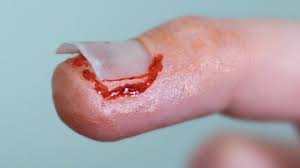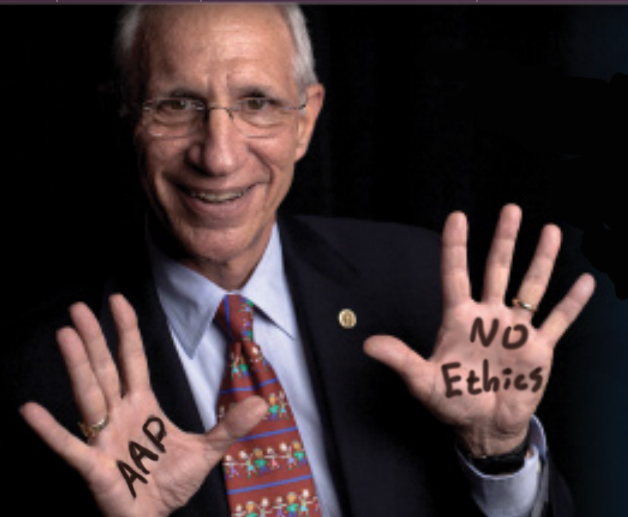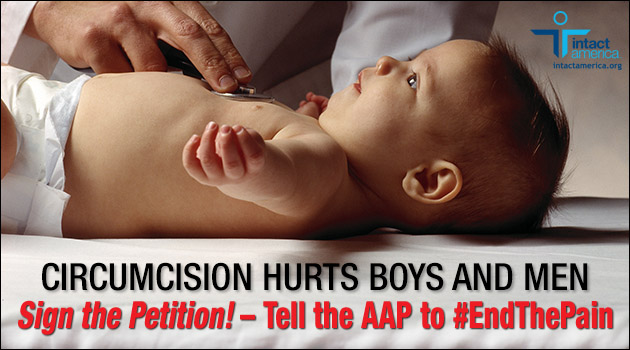Dec 1, 2021
On October 11, 2021, the New Yorker magazine published an essay by popular writer Gary Shteyngart, recounting how being circumcised when he was seven years old resulted in decades of misery and complications. On November 1, the magazine published three comments in response, mine, one from a rabbi, and one from a urologist. The post below is the follow-up letter I wrote to the urologist, Dr. Michael Mooreville.
Dear Dr. Mooreville:
I am writing about your letter to the New Yorker, which appeared after my own among the responses to Gary Shteyngart’s essay about his decades of suffering because of a botched circumcision. Thank you, in advance, for taking the time to read my comments below.
First, you suggest that Shteyngart’s problems occurred because he was circumcised too late, and then say that it’s easier (somehow) for a physician to know how much foreskin to remove from a baby than from an older male. My decades of working to end unconsented-to, medically unnecessary circumcision suggest this is not true. Men who have spoken or written to me, or who have spoken out publicly about their circumcision-induced penile deformities, overwhelmingly were circumcised as newborns by doctors in American hospitals. Some of them have undergone one or more additional surgeries to correct cosmetic or functional problems; others, out of parental ignorance or shame, instead have learned to live with the harm just as Shteyngart did. In none of these cases did any of these surgeries result in a better, healthier penis than the penises of men who were fortunate enough to have grown up with their natural, unaltered genitalia. As a practicing American urologist, your caseload is likely similar to that of other urologists who have told me that more than one-quarter of their medical practice involves addressing circumcision-related damage, including meatal stenosis (which occurs nearly exclusively in circumcised males), skin bridges (such as Shteyngart’s), and degloved penile shafts.
Second, I am curious about your comment that amputating a baby’s foreskin will allow his penis to “grow into a fully mature look…” (emphasis mine). Are you suggesting that the penises of men with foreskins (comprising around 75% of the world’s males) are somehow “immature”; this makes no sense. How can a penis shorn of its natural protective covering, with its nerves, muscles and blood supply be superior to the natural, unaltered penis that evolved over hundreds of thousands of years? Frankly, I’m astonished that the New Yorker’s rigorous fact-checking protocol didn’t eliminate this nonsensical statement from your letter.
Finally, I wonder if there are other healthy body parts you would suggest removing from babies or children because they “can be the source of multiple (?) medical problems in older men” (or women). The appendix (1.1 cases of appendicitis per 1000)? Teeth (prone to infection-causing decay)? Breasts (1 case per 1000 of breast cancer among American women aged 40, increasing over time), while the rate of penile cancer (which occurs in both intact and circumcised men) in the United States is 1 per 100,000. I might add here that genital hygiene is not complicated. If a boy can learn to become a teacher or chef or woodworker or tennis player or truck driver or urologist, he should be able to learn how to wash his penis.
I hope you will think about my questions, and dare to think in a more common-sense way about a forced bodily alteration that does nothing to make American boys or men healthier than their counterparts in countries where males retain the genitals they are born with.
Sincerely,
Georganne Chapin, MPhil, JD
Executive Director

Feb 11, 2018
Georganne Chapin, MPhil, JD
Increasingly, new parents are questioning the peculiarly American practice of “routine” infant circumcision. They’re heeding their own instincts, doing their research, and choosing to protect their sons’ bodies and right to keep the genitals nature gave them.
Unfortunately, many of these parents and their sons now face a new worry – an iatrogenic[1] epidemic of forced foreskin retraction, the result of ignorance and bias among U.S. healthcare professionals.
A new lawsuit shines a bright light on this insidious practice. On January 10, 2018, Atlanta attorney David Llewellyn filed a Complaint against a major pediatric hospital in that city, describing its disregard for current pediatric care guidelines, and its nursing staff’s systematic violation of patient rights.
Alleging battery; nursing malpractice; intentional infliction of emotional distress; willful, wanton and reckless misconduct; and negligent failure to protect the patient, Park v. Children’s Healthcare of Atlanta catalogs the actions by a nurse who – without conversation or warning – ripped away the foreskin of an intact 2-month old baby named Jude Parks, causing him severe pain, bleeding and emotional anguish. The Complaint also describes the defiant attitude taken by the nursing supervisor and other hospital staff, who insisted – contrary to fact – that the hospital’s protocol calling for the forced retraction of all intact boys’ foreskins was derived from current established medical recommendations.
Some Background
Starting in the late 1800s, Victorian-era doctors began promoting foreskin-removal as a way to make boys stop pleasuring themselves. (It didn’t work) By the mid-20th century, routine medical (i.e., non-religious) amputation of baby boys’ foreskins had become a peculiarly American phenomenon – fueled, no doubt, by the fact that health insurers paid for it. Today, an estimated 80 million adult American men are missing a palm-sized area from their penises. Even with increased parental awareness – still, over half of all baby boys born in the U.S. are victims of a medical system that makes money from the procedure. But with the voices of aggrieved men becoming louder, and parents questioning the bogus medical claims that there’s something inherently unhealthy about the natural penis, circumcision rates continue to fall.
Most Americans, though, remain surprisingly unfamiliar with the intact penis. Parents who choose to keep their sons intact get little or – worse – the wrong information about how to care for their sons’ genitals. They don’t know that a tight or adherent foreskin (called physiologic phimosis) is normal in babies and boys, and that over time, the foreskin will loosen and separate naturally from the head of the penis. They don’t know that the average age of spontaneous foreskin retraction is actually around ten years of age, and that nobody should but the boy himself should try to hasten this process along.
Though ignorance and misinformation are widespread, the pediatric literature itself (including guidelines from the American Academy of Pediatrics) actually is clear: a baby’s foreskin should NEVER be forcibly retracted. Using force to pull back a boy’s foreskin is painful, and can cause swelling, bleeding and infection.
What Happened to Baby Jude?
According to the above-mentioned lawsuit, Jude Parks was referred by his primary doctor to Children’s Healthcare “because he had been vomiting often and the vomit was of a disturbing color.” He was accompanied by his mother Ms. Parks and his maternal grandmother. The Children’s Healthcare physician who examined Jude ordered tests for blood and urine. Nurse Sorrells (a named Defendant in the lawsuit) “took off Jude’s diaper, apparently to obtain a urine specimen, and, without comment and without asking permission to do so, forcibly tore and retracted his foreskin all the way back off of his glans, to which it was naturally attached… caus[ing] the end of Jude’s penis to become bloody. Jude started screaming. Neither his mother nor [his grandmother] had ever hear him scream like that before. Neither has heard him scream that way since.”

When Jude’s mother told Defendant Sorrells that no one is supposed to retract and tear an intact boy’s foreskin, the nurse insisted that what she’d done was proper, and that Ms. Parks herself should be retracting Jude’s foreskin at every diaper change. A nursing supervisor subsequently appeared and told Ms. Parks it was hospital protocol to retract intact boys’ foreskins – that they did so in every case. She also said that Jude not being circumcised “leaves him open for infection.”
For weeks after the incident, the Complaint states, Jude manifested pain, and anxiety whenever his diaper was changed. The Complaint further alleges that Jude’s foreskin is scarred, and he may need surgery later on in order to be able to retract it.
The Complaint provides exhaustive evidence that the actions performed upon Jude, and the hospital protocol supporting those actions, violate current medical standards and guidelines, including those from the American Academy of Pediatrics. It further alleges that Children’s Healthcare was aware or should have been aware of these standards and guidelines. Finally, it provides a reference to a contemporary article by Adrienne Carmack, MD and Marilyln Milos, RN confirming that it is not necessary to retract a boy’s attached foreskin to insert a catheter.
While it’s too late to protect Baby Jude from this harm, it is possible to protect the thousands of intact boys like him.
If you are the parent of an intact boy:
- Do not allow a doctor, nurse or anybody else to forcibly retract your son’s foreskin. Make a point of telling your pediatrician this up-front, and providing this information in his medical chart. If you do take your intact boy to an emergency room, let the provider(s) know that foreskin retraction is off-limits.
If your baby has been subjected to forced retraction:
- The soreness and swelling will likely resolve on its own. Watchful waiting, and bathing him in plain warm water (no soap or bubble baths), are the best recourse for healing. If he does not improve, or if there is pus or smelly discharge, seek medical help – preferably from a foreskin-knowledgeable physician. Let the new doctor know that you will not tolerate further tampering with your son’s foreskin.
- You are entitled (and we encourage you) to complain in writing to the doctor who performed the retraction and the facility where this battery took place. At a minimum, you should provide them with factual information, such as the Carmack and Milos article referenced aboveand this information sheet. You may also file a complaint with your state’s medical board or office of professional discipline. Finally, you may wish to explore filing a lawsuit. Should you choose to do so, Intact America can help you or your attorney with the pertinent resources. Contact us at [email protected] or write to me directly at [email protected].
Over time, as the ranks of intact American men increase, medical professionals will learn the facts and foreskin bias will subside. Until that time, it’s not simply enough to keep your son intact. Ongoing education and vigilance will remain necessary until Americans realize that nature put the foreskin there for a reason – and that it’s something we should value, rather than fear.
[1] I.e., caused by the medical system. Iatrogenesis refers to any effect on a person, resulting from any activity of a person or persons acting as healthcare professionals or promoting products or services as beneficial to health that does not support a goal of the person affected.

Feb 21, 2016
Last week, Intact America launched a petition to the American Academy of Pediatrics (AAP). The petition demands that the AAP follow the recommendations from its own research about infant pain, and tell its doctors to END THE PAIN and stop circumcising baby boys. Our goal is 29,000 signatures by February 29. We need your help! Please sign this petition, and share it with your friends. Ask them to sign and share it, too!

Intact America insists that the American Academy of Pediatrics issue a new circumcision policy—one that honors and protects baby boys from harm.
The American Academy of Pediatrics (AAP) recently said that babies shouldn’t be subjected to unnecessary pain. But the AAP continues to promote “routine” infant circumcision, a painful, medically unnecessary surgery that removes a normal part of a baby’s penis.
Last month, the AAP published research showing that common medical procedures carried out on newborn babies are very painful, and that the effects of the pain can last many years. The procedures mentioned included heel sticks, insertion of IV needles, and circumcision. The AAP report also found that commonly used pain relievers are neither effective nor safe.
Infant circumcision differs from the other procedures discussed in the report in that it is an invasive surgery that neither tests for nor treats any illness, and permanently removes a natural and valuable part of a boy’s sexual anatomy – the foreskin. The pain from circumcision is intense and continues for days or weeks after the surgery.
Circumcision, originally promoted in the 19th century as a way to prevent masturbation, has become part of American medical culture. Every year, a million baby boys in the United States are subjected to this surgery, although no medical association in the world recommends it.
Some of the falsehoods currently used to support circumcision include hygiene, disease prevention, and aesthetics.
The truth is:
- The intact penis is easily cleaned throughout a boy’s and man’s lifetime.
- Circumcision does NOT prevent sexually transmitted diseases, including HIV. European countries where fewer than ten percent of all men are circumcised have about the same STD rates as the United States, where circumcision is common.
- Any preference expressed by men or women for the circumcised penis is a result of cultural conditioning. Besides, as the U.S. circumcision rate declines, and the number of intact boys and men grow, the intact penis will no longer seem strange or unattractive.
Many Americans also believe that circumcision is “just a snip” – a minor, brief, and painless procedure that babies will not remember. This is FALSE, and the new AAP article on pain proves it.
Because circumcision is NOT medically necessary, and because the pain it causes is unmanageable and harmful over the long term, Intact America demands that the American Academy of Pediatrics tell its doctors to end the pain and stop circumcising baby boys.
Help us reach 29,000 signatures by February 29, 2016.
Please sign our petition TODAY.
Jun 16, 2013
When I first started speaking out against circumcision, some of my friends were taken aback; they hadn’t ever really thought about it, and they couldn’t understand why I’d devote so much energy and time to this as a cause. It’s just a flap of skin, isn’t it? Babies don’t feel or remember getting it “snipped off,” right? So what’s the big deal? Men, in particular, rolled their eyes, teased me, and wondered out loud what on earth I was so upset about.
Over the years, as the awareness of circumcision as an issue has grown, many of these same male friends have returned to tell me, upon reflection, that allowing their sons to be circumcised was the worst parenting mistake they’d ever made, the thing they most regret. More men than I can count have told me it’s the one thing they can’t forgive themselves for, even though they’d had no sense of the magnitude of their decision. It breaks my heart every single time I hear, “I had no idea what circumcision really meant, and I had no idea I would regret it.”
Some people, of course, do know, and they make the same terrible mistake. A couple of years ago, columnist Joel Stein wrote an essay for Time magazine in which he questioned whether his son should be circumcised in the Jewish faith. The piece ends with this paragraph:
“So in a few weeks, I’m going to buy some bagels, call a mohel who is also a pediatric surgeon and believes in local anesthetic, and do something that I’m pretty sure is wrong. I have a horrible feeling that all of parenthood is like this.”
Well, I don’t believe that “all of parenthood is like this.” Many mistakes we make as parents are unwitting; they don’t involve clear yes-or-no decisions; you just roll with the circumstances and hope for the best. Circumcision, however, is different. It’s a clear yes-or-no situation. And its consequences are utterly irreversible. Given that Stein’s misgivings were pre-recorded, I can’t imagine he will have a lot of credibility with his own son should he one day say, “I’m sorry I allowed this to happen to you.”
It takes a great deal of courage to look back as a parent and say, “I was wrong.” It also takes courage to resist the pressure from families, faith communities, doctors, and society at large to do something that “everybody does”—and is, at the same time, too embarrassing to talk about. Couple all of this with the fact that many men who regret saying yes are, themselves, victims of parents who were unable to say no.
Bravo to the fathers who have apologized to their sons; and bravo to the fathers who have stopped the cycle of harm, refusing to “consent” to the removal of a part of their sons’ beautiful, normal bodies.
Pass this on, share this post, or just simply start talking about it, because the single most effective way to prevent circumcision is to start the conversation—whether you’re sharing your own experience/pain/regret, or asking pregnant friends if they’ve thought about circumcision. You’ll find that once people really consider it and find out the facts, they’ll realize they are likely to regret it down the road if they allow their sons to be circumcised. (If they’re still on the fence, show them this video by Ryan McAllister, a bioethicist and research professor at Georgetown University. FYI, it includes graphic footage of a circumcision—which is the whole point.)
As parents, we’re often tasked with having to make tough decisions on behalf of our children—but this isn’t one of them. Pass it on.
Georganne Chapin
May 12, 2013
My mother passed away 11 months ago, so this is the first Mother’s Day I am spending without her in my life. I miss her so much.

Helen Chapin
Growing up, but especially during my younger adult years, I had my share of grievances against my mother. Over the years, I occasionally confronted her with some of my complaints. Some of her responses satisfied me, while others did not. Sometimes airing my complaints was healing, but in other cases I even got perverse pleasure from seeing that she felt badly about certain parenting decisions she’d made.
A few years ago, though, my grievances against my mother simply dissolved. She was starting to become ill, and – all of a sudden – I saw her not as a formidable figure, one who could give and withhold, one who could shape my happiness and unhappiness, but rather as a woman like me, a mother who made the best choices she could at the time she had to make them. From one day to the next, I realized, truly absorbed, that she loved me, and that she had done the very best she was able to do. I also found that by losing any anger and resentment I held toward my mother, and allowing myself to accept and simply love her, my own life became more peaceful and more purposeful.
Since I became involved in the movement to stop the genital cutting of baby boys, I have heard many maternal remorse and child anger stories.
Mothers have called into radio programs where I was a guest, sobbing from grief and regret about having allowed their baby to be circumcised; some of these have been the mothers of toddlers, but many are recounting stories from 15, 20 or even 40 years earlier. For every one of these mothers, there is a son – a boy or man living with the consequences of a decision he did not make, but that is imprinted on his body and in his brain forever. And I have talked to hundreds, maybe even thousands, of such sons.
Many men struggle to resolve their feelings about having been robbed as babies of their right to a complete body; some struggle with where to place the blame. Some blame the doctors; others take issue with society’s blind acceptance of the ritual, and know they were victims of a terrible tradition. The saddest thing for me, though, is men who continue to blame their mothers; this seems to happen especially if they have attempted to talk with their mothers about their feelings, and have been rejected or told that their anger and feelings of loss are overblown or unimportant or, somehow, illegitimate.
This kind of response is tragic for both parties. While my own sins as a mother do not include acquiescing to the genital cutting of my child, I have done many things I now see were foolish, and I have heard plenty of grievances from my son. I am trying, though, to give myself a break, because while I fully acknowledge his feelings, I know how much I have always loved him, and that I did the best I knew at the time.
I also believe that, with (thankfully) very few exceptions, we mothers love our children and try to do the best for them.
We live in a society that accepts as normal a strange and barbaric ritual promoted as health care, and carried out by authority figures who are promoted (and promote themselves) as healers. We shouldn’t allow ourselves to lose sight of the power of custom and of authority, especially during those times (such as childbirth) when we are most vulnerable and most desirous of doing what’s right. With circumcision, both new mother and newborn baby are victims.
My Mother’s Day wish is that mothers apologize to their sons and forgive themselves, and that sons forgive their mothers. We can then all work together on fighting the custom and the real perpetrators of this awful legacy called circumcision.
Georganne Chapin




